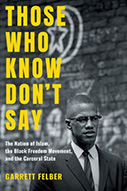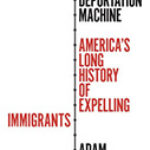Those Who Know Don’t Say: The Nation Of Islam, The Black Freedom Movement, And The Carceral State

Author: Garrett Felber
Publisher: Chapel Hill: The University of North Carolina Press, 2020. 272p.
Reviewer: Andrew S. Baer | May 2021
While scholars often emphasize the Nation of Islam’s (NOI) separatism and rejection of formal politics, Garrett Felber’s Those Who Know Don’t Say argues that the Muslim organization regularly launched or joined broad political coalitions to challenge police and prison administrators throughout the 1950s and 1960s. In a process Felber calls the “dialectics of discipline” (2), a dynamic relationship between state repression and Black resistance at the local level helps explain the rise of the so-called carceral state during the last third of the twentieth century. By elucidating the NOI’s role in protecting Black people from a racist criminal justice system, Felber’s excellent book broadens scholars’ view of the Black freedom movement—widening its cast of characters, expanding its sites of struggle—and collapses false dichotomies between civil rights and Black Power.
Felber’s examination of NOI political agitation begins with Muslims challenging prison regulations in the 1950s, before exploring police accountability movements in the 1960s. Through an influential series of civil lawsuits, NOI members and lawyers helped launch and sustain a prisoners’ rights movement with far-reaching implications by the early 1970s. Indeed, the U.S. Supreme Court decision in Cooper v. Pate, filed on behalf of NOI member Thomas X Pate, helped guarantee the constitutional rights of all incarcerated men and women after 1964 (11). Confronted by police harassment in cities throughout the United States, the NOI also forged coalitions around the one issue that plagued Black people of all ideological persuasions—police brutality. In New York City, for example, a short-lived—and Blacks only—Emergency Committee for Unity on Social and Economic Problems united a diverse cross-section of African Americans in pursuit of police reform. The NOI’s leadership in this and similar coalitions shatter’s perceptions of the organization as operating solely outside the civil rights establishment, and disinterested in the fate of non-Muslims. Indeed, Felber later places NOI spokesman Malcolm X’s famous November 1963 speech “Message to the Grassroots” in a new context.
When Malcolm dismissed the earlier March on Washington as a “farce” and a “circus,” Felber argues, he was not merely hurling invectives “from the sidelines” (118). Rather, Malcolm’s critique stemmed in part from his view that the celebrated march had “betrayed many of the foundational principles of Black unity that had coalesced” in earlier coalitions aligned with the NOI — including “Black leadership, broad-based but all-Black political coalitions, refusal of white financial support, and militancy” (118). Scholars often depict the NOI as rejecting all engagement with American politics. Felber’s nuanced analysis of the NOI, however, reveals an organization committed to militant Black independence yet willing to work publicly with other groups under the right circumstances.
The book ends with an examination of the state’s response to Black rebellion in Harlem, Watts, and Attica prison between 1964 and 1971. While Felber places these events in the context of enduring Black protest led by members of the NOI, authorities characterized them as spontaneous and apolitical riots. Arguing that operatives of the carceral state thus exacerbate physical violence with “epistemic violence” (14), Felber shows how authorities mischaracterized both the NOI and the nature of Black resistance in order to blunt the movement’s impact, suppress further rebellion, justify an increase in state power, reinforce punitive logic, and distort the legacy of the NOI.
Andrew S. Baer is an assistant professor of history at the University of Alabama at Birmingham. He is the author of Beyond the Usual Beating: The Jon Burge Police Torture Scandal and Social Movements for Police Accountability in Chicago (University of Chicago Press, 2020).


